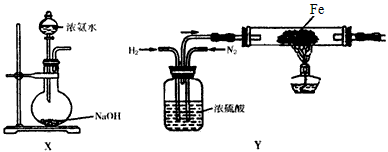某校化学研究性学习小组的同学在学习了氨气的性质后讨论:运用类比的思想,既然氨气具有还原性,能否像H2那样还原CuO呢?请你参与该小组的探究活动并回答下列问题:
(1)写出实验室制取氨气的化学方程式:____________________。
(2)有同学类比排饱和食盐水收集氯气的方法,想用排饱和氯化铵溶液的方法收集氨气。你认为他能否达到目的?_________(填“能”或“否”)。
(3)该小组某同学设计了下图所示的实验装置(夹持及尾气处理装置未画出),探究氨气的还原性。

该装置在设计上有一定缺陷,为保证实验结果的准确性,对该装置的改进措施是_______________
(4) 利用改进后的装置进行实验,观察到CuO变为红色物质,无水CuSO4变蓝色,同时生成一种无污染的气体。写出氨气与CuO发生反应的化学方程式:_____________________
(5)若将改进后的装置中的A换成下图中的X,能否顺利完成实验?__________ (填“能”或“否”)。小组中的某同学将A换成了下图中的Y,结果无水CuSO4变蓝色,据此削断氨气与CuO发生了反应。你以为他的结论是否严谨?_______ (填“是”或“否”)。原因是____________________。

(1)Ca(OH)2+2NH4Cl CaCl2+2NH3↑+2H2O
CaCl2+2NH3↑+2H2O
(2)否
(3)在A和B之间加一个装有碱石灰的U形管
(4)2NH3+3CuO 3Cu+N2+3H2O
3Cu+N2+3H2O
(5)能;否;H2也能还原CuO,且产物能使无水CuSO4变蓝
